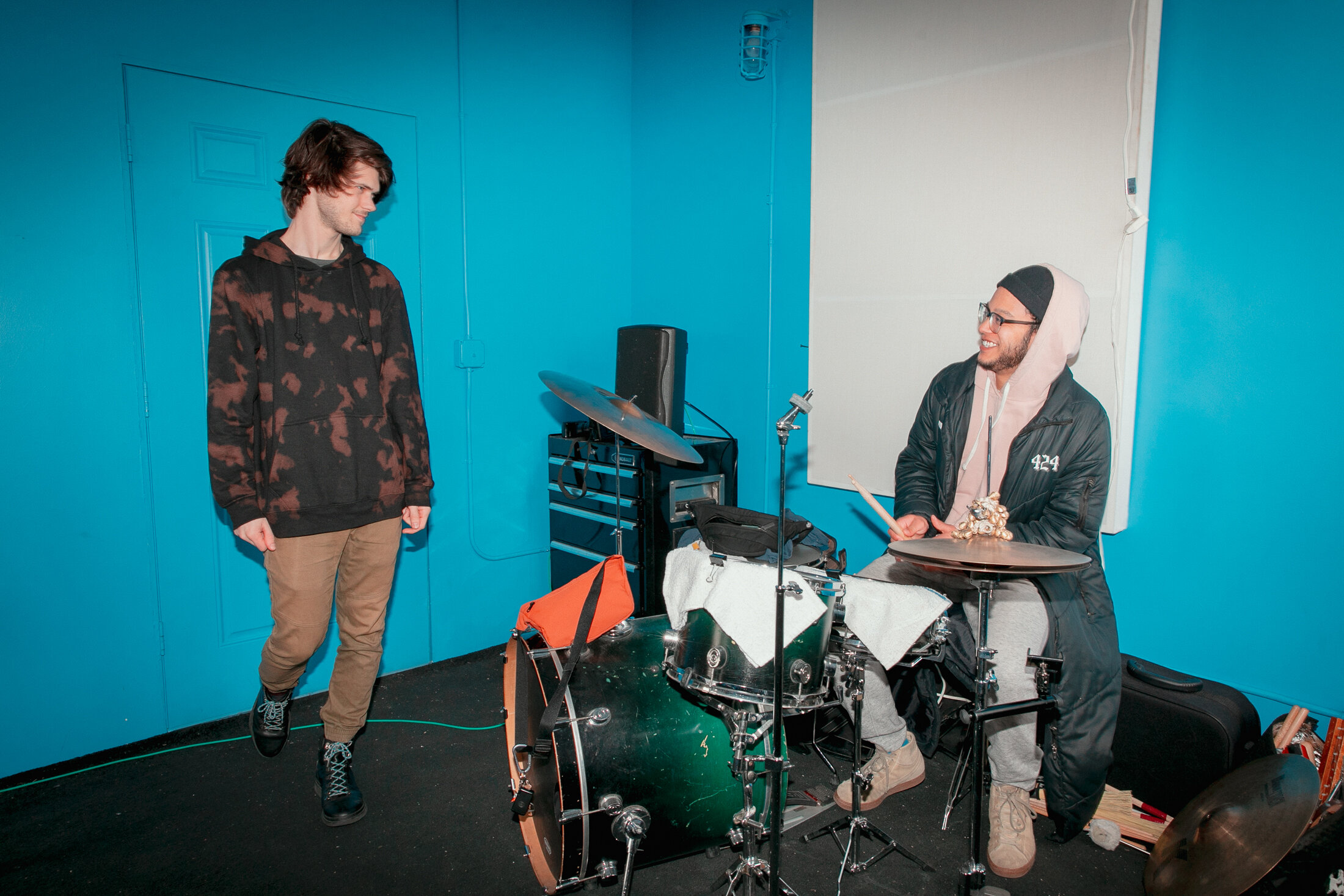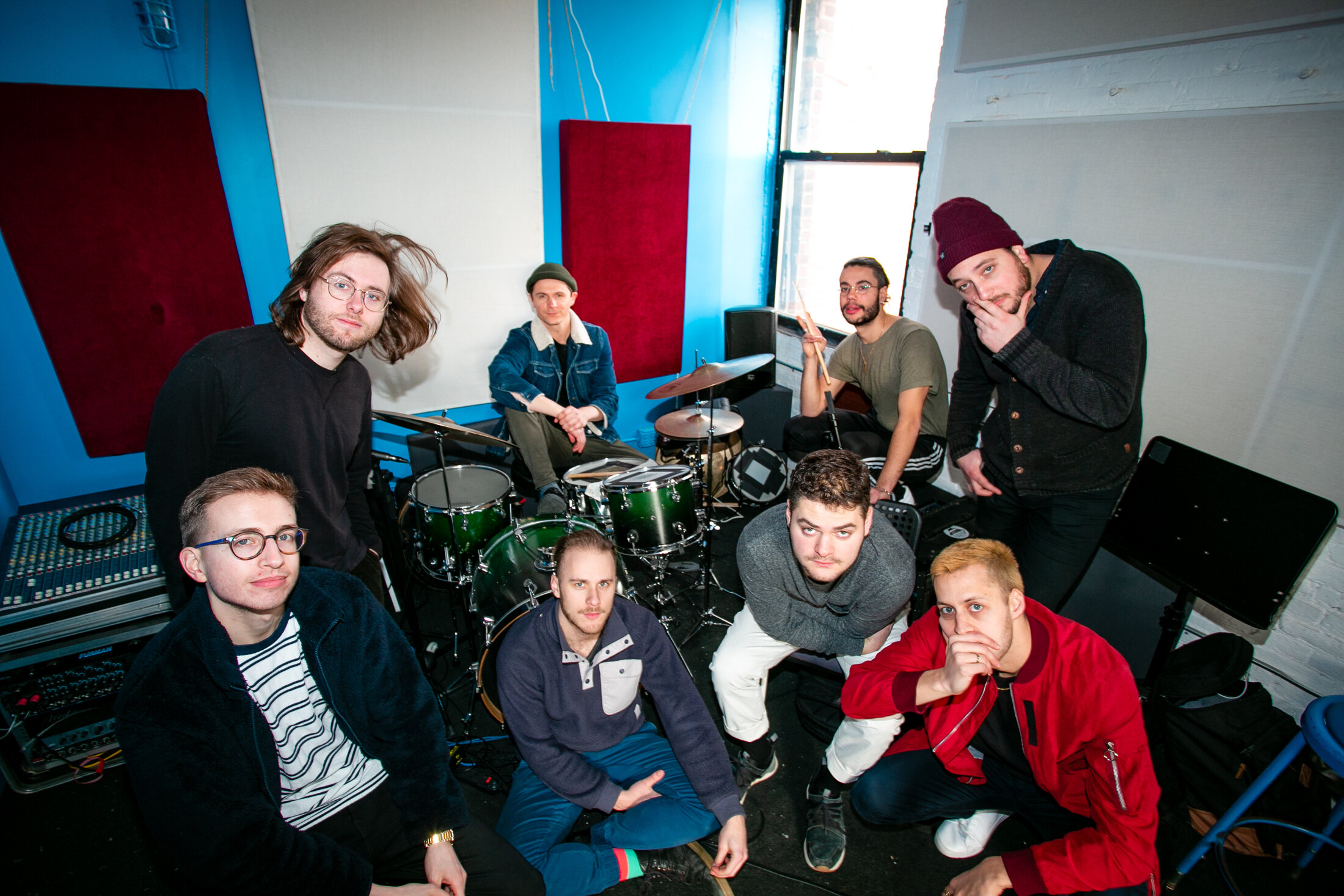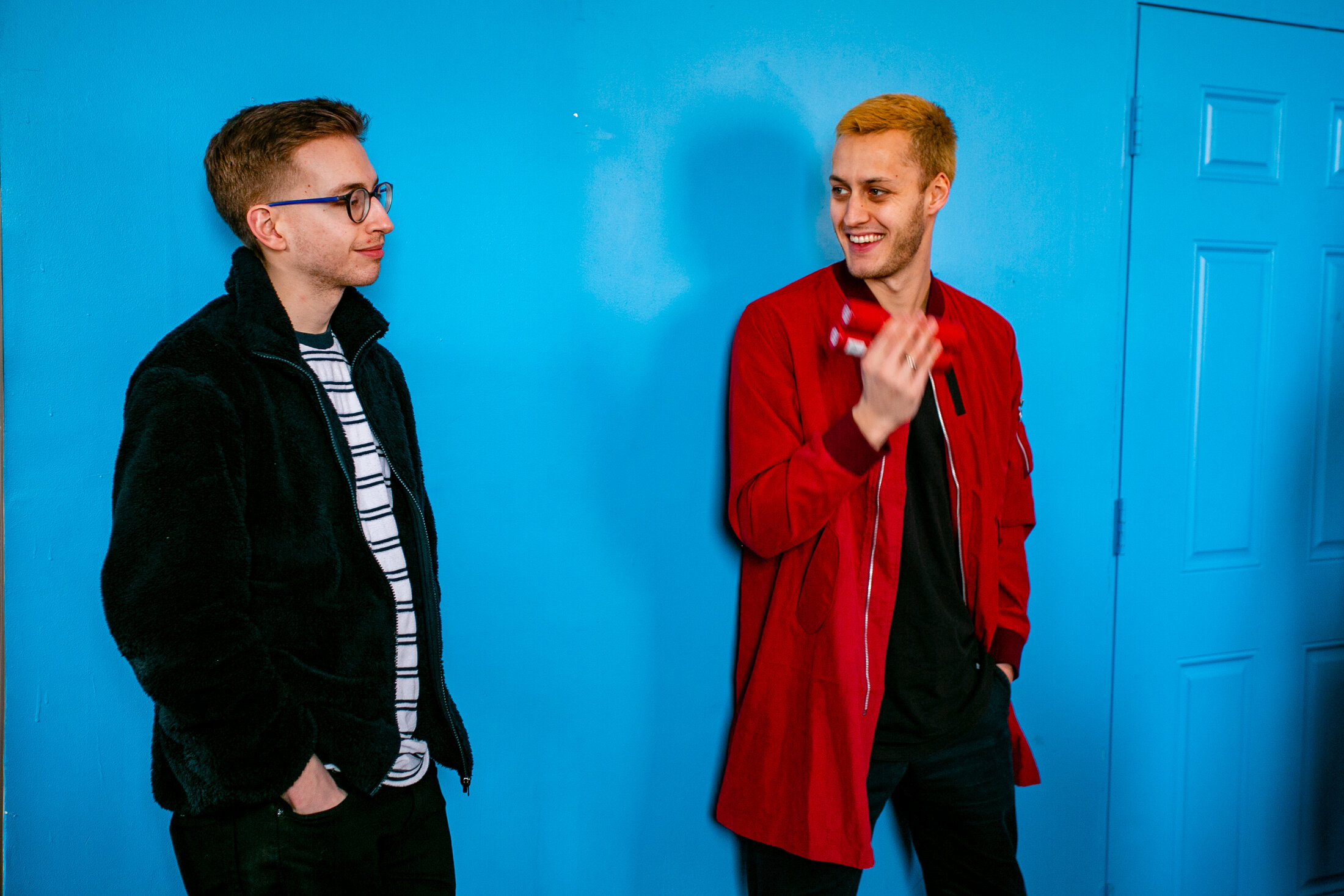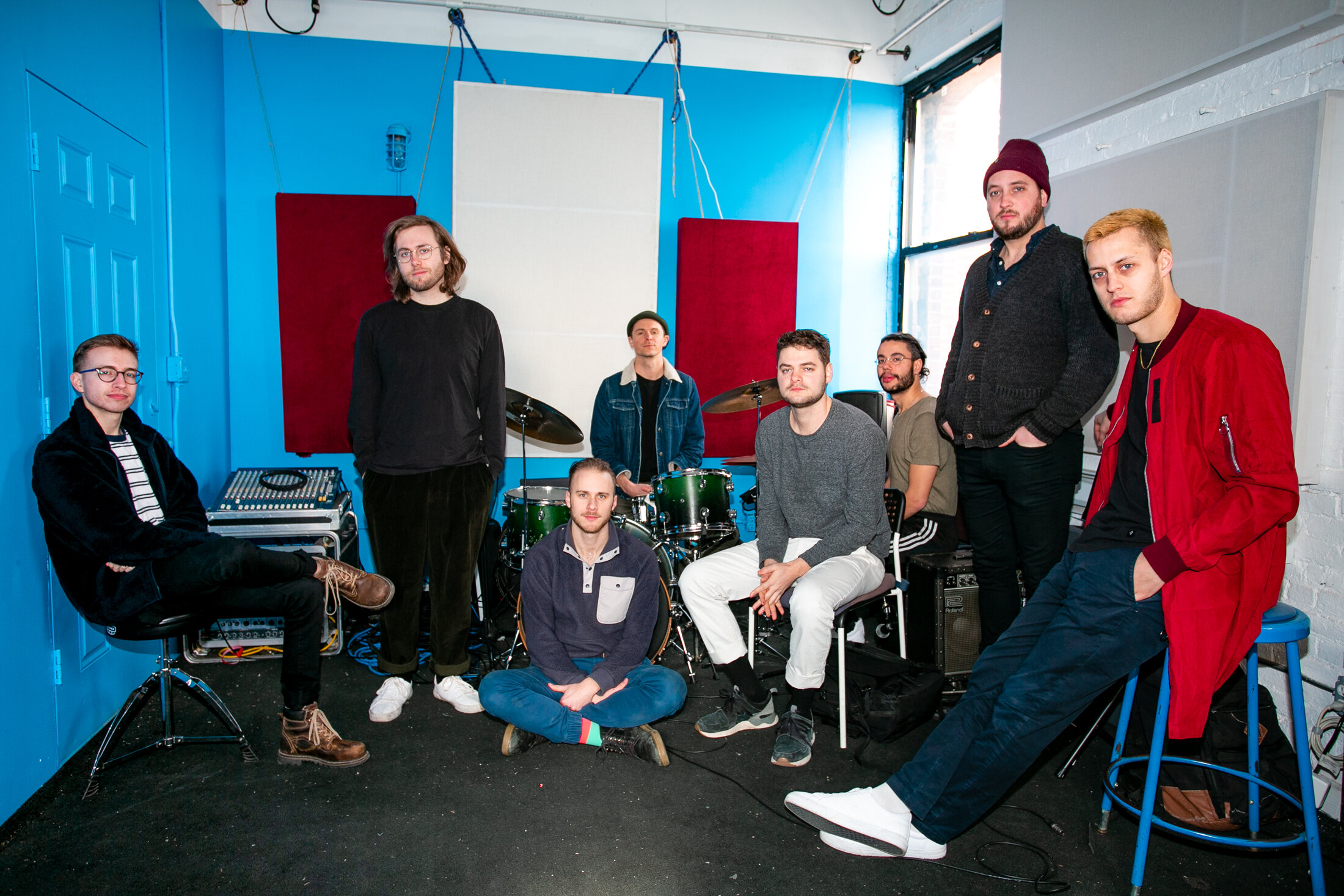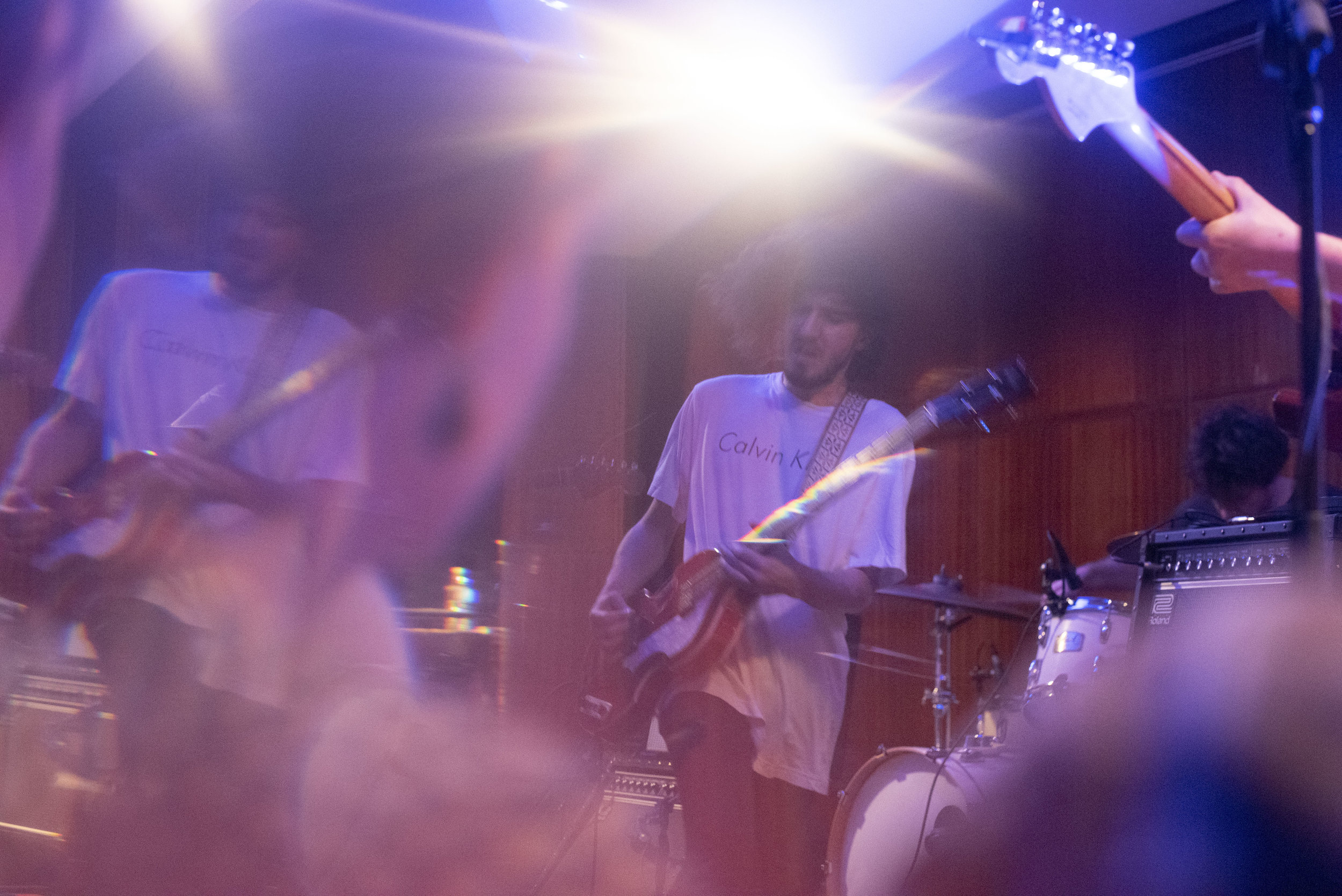Photo by Gaia Feldheim Schorr
By Charley Ruddell
In support of their forthcoming album farawayfromeveryoneyouknow, we sat down with Jesse Bielenberg and Dillon Treacy of Brooklyn-based experimental group altopalo to discuss their musical origins, passion in friendship, Indiana getaways, eliminating ego from composition, the toxicity of convenience culture, and so much more.
Farawayfromeveryoneyouknow, featuring the singles “honey” and “am i am,” is set for release on 4/24 via Samedi Records.
Altopalo is Rahm Silverglade, Mike Haldeman, Jesse Bielenberg, and Dillon Treacy.
ThrdCoast: How did you guys meet?
Dillon: College.
Jesse: Yeah, we started making music in college.
Dillon: Are you like Rita Skeeter from Harry Potter?
ThrdCoast: Exactly.
Dillon: I actually just saw that for the first time recently.
Jesse: Was that the fourth one? With Robert Pattinson?
Dillon: With Robert Pattinson! Yeah!
Jesse: I was trying to remember the name of his vampire character…
ThrdCoast: Edward.
Jesse: Edward Cullen! Yeah!
Dillon: Now he’s Batman.
Jesse: What! Oh God.
ThrdCoast: Edward is, not Robert Pattinson.
Dillon: Batman is a vampire now.
ThrdCoast: So who met who first?
Jesse: Rahm and I met first.
Dillon: That’s wrong!
Jesse: No, I met him in June.
Dillon: We met each other on Facebook.
Jesse: That’s not meeting!
Dillon: I was looking for a roommate and the other person I was rooming with said we should look for another musician so we hit up Jesse because he looked cool. I just messaged him and was like, “Hey, we’re looking for a third—you in?” And he said, “nah.”
ThrdCoast: Really?
Dillon: Yeah, he said, “nah.” (laughs)
Jesse: That is the first interaction with any of you that I ever had.
ThrdCoast: Why did you say no?
Dillon: It was for a very good reason.
Jesse: It didn’t pan out well, but I wanted to live with someone who wasn’t studying music because I figured I’d be spending most of my time with musicians anyway. I wanted to have some diversity in my social life. But my roommate ended up being an asshole—
Dillon: He’s a boxer now!
Jesse: Yeah, he was an amateur boxer when we were living together. He was just aloof and said a couple of offensive things. I don’t know, you just don’t experience everything when you’re growing up—
Dillon: I’ve never watched an episode of “Friends.”
ThrdCoast: Really?
Dillon: Or “Seinfeld.”
ThrdCoast: “Seinfeld” is good. “Friends” is not good, but it’s crushable. If you just need to crush a TV show, watch “Friends.”
Dillon: My sister did all 10 seasons in like a month!
Jesse: I think “Friends” is some trash.
Dillon: It’s offensive television.
Jesse: Anyways, Dillon asked me to be his roommate, I said no, but we became best friends that year anyway. He asked me to be his roommate again, and I said no again, but we eventually ended up living together.
ThrdCoast: Where does Mike fit into this?
Dillon: He’s from Philly. He would play with like John Anderson of Yes when he was 16, and Dweezil Zappa, too.
ThrdCoast: Aren’t the King Crimson people in Philly as well?
Dillon: Yeah, yeah.
Jesse: Adrian Belew is one of Mike’s favorite guitar players.
Dillon: So Mike grew up in that whole scene and took a gap year between High School and College and him and all of his homies—like, Elijah from Phony Ppl—lived in a house together for like a year.
Jesse: And the Arc Iris guys, too.
Dillon: All of those people are doing really cool things right now. That was a really cultivating community.
Jesse: This was 2010. He lived in this house with a bunch of outboard gear and tape machines with a bunch of 18-year-olds just trying to figure it out.
ThrdCoast: Where are all of you from?
Dillon: I’m from Milwaukee.
Jesse: Rahm and I are from different suburbs of Chicago. And Mike’s from the horse country outside of Philadelphia.
Dillon: Mike’s mom is also from Minnesota, so all of us are basically midwestern.
Jesse: There’s definitely a midwestern energy in the band.
Dillon: What’s also crazy is that Jesse, Rahm, and I were all born in the same week and the same year.
ThrdCoast: What’s your sign?
Jesse: We’re all Aquarius.
Dillon: I’ve always said that instead of birthdays, we should just celebrate the sign.
ThrdCoast: Like a Socialist birthday.
Dillon: Yeah!
Jesse: (yelling) There’s 12 birthdays a year, you get it, and then you’re done!
Photos by Rachel Kuzma. Bassist Jesse Bielenberg and drummer Dillon Treacy pictured.
ThrdCoast: So when you guys get here in 2011, you’re all just playing music with other people?
Jesse: Yeah, there was a point where we were all playing like five gigs a week, separately or together. I think the seminal moment for us as a band—
Dillon: Fall of 2013.
Jesse: We were all pretty used to assuming this role as supportive instrumentalists with a creative input. We were so used to backing our friends and we found ourselves in this community of instrumentalists. And then all of a sudden, like four singers all had the same four people behind them and we became this kind of house band for these people we knew.
ThrdCoast: Who were all of these people?
Dillon: Kiah Victoria—
Jesse: Kiah, and there was a moment when we were playing with Topaz Jones, Anais, our friend Emma…
Dillon: There were some moments where we were all asked to be in a band without all of us having ever played with each other. It was the first time I met Mike. But Jesse and I had always talked about forming a band.
Jesse: We had a first version of a band that was playing really insincere neo-soul music. Dillon and I tried that for like a year. We had this other band with a different guitar player and a different keys player, and it was fun but also just so green.
Dillon: We were also 19, you know?
Jesse: There was a big shift when the four of us became regularly acquainted.
ThrdCoast: What’s this moment when you’re all assembled?
Dillon: A friend of ours needed a band for some festival and she asked me, Mike, and Rahm to do it. I think she asked Jesse too but he couldn’t do it. Mike was playing bass, I was playing drums, Rahm was on keys. I had known Rahm peripherally, but I had never met Mike before. Mike and I just hit it the fuck off. And then like two days before the gig, we found out that Jesse was actually available—
Jesse: I had this gig with another band in Connecticut that fell through, so on a whim I asked if they still needed me for the thing.
Dillon: I had no idea that Mike played guitar.
Jesse: Yeah, the gig was just playing covers, we were playing like Little Dragon and Dirty Projectors—
Dillon: It was so fun!
Jesse: And then we just sort of hit it off and Rahm would bring some compositions to us occasionally and we were like—
Dillon: “This is sick.”
Jesse: Yeah, like it was really something else. We tried playing them and none of them really went anywhere, but we workshopped them to make them a little more collaborative.
Dillon: Yeah.
Jesse: In 2015 we put out a record that we wrote—the four of us—and that was us learning how to write as a band and play off of each other’s idiosyncrasies using all of our strange, eclectic educations. I had this weird DIY relationship with recording in Ableton and Rahm was interning at a studio learning about mixing, and Mike had done the studio-house thing; Dillon had been playing drums for like 20 years at this point. Everyone’s tastes were meshing in this really unforseen way. We spent years trying to figure out how those things interlocked.
ThrdCoast: What happened to that record?
Dillon: It’s on Bandcamp. But just to piggyback on what Jesse was talking about how we became best friends—we all lived together or down the block from each other. I swear to God we hung out like five times a week either collectively or individually. Other than just playing music, there were so many instances of us becoming best friends in a really organic and beautiful way.
Jesse: Friendship is really important, and we can’t state that enough.
ThrdCoast: So you put out this record in 2015?
Jesse: Yeah, noneofuscared. We had been a band for two years at this point. Making it was really arduous and long.
Dillon: Oh my God, we had so many ways of doing it.
Jesse: We did a week at our friends in Great Time—they have a studio in Westchester, Pennsylvania called Great Time Studios, and we recorded some stuff there.
Dillon: Then we had our space—
Jesse: We just brought a bunch of mics onto our own space and recorded there. We did one day at Rubber Tracks, too.
ThrdCoast: So it was a hodgepodge process.
Jesse: Yeah, which is still kind of how we do it, we’re just better at it now.
ThrdCoast: What’s going on between 2015 and 2018?
Dillon: Ha!
Jesse: That’s an amazing question. We put that record out and then I started touring like ten months out of the year with Kevin Garrett.
Dillon: And I was playing with this band Handsome Ghost from February to the end of May in 2016 while Jesse was with Kevin at that time. Then Jesse and I started playing with this jazz artist named Kandace Springs from the Summer until January of 2018.
Jesse: I did quit that band though, it was not for me. But we basically graduated and had to choose—we had to see if we could be professional musicians. We were still in this role of needing to play an instrument to pay the bills. We were paying our dues.
ThrdCoast: What are Mike and Rahm doing at this point?
Jesse: Mike was audio engineering and Rahm was producing for people—
Dillon: This was when he was producing for Kiah. And then…
Jesse: He was…
Dillon: Wait, what the fuck was Rahm doing at that time?
(laughter)
Jesse: Rahm lived in a one bedroom apartment and spent ten hours a day making sounds on his computer.
Dillon: He’s so hyper-focused.
Jesse: He’s addicted to sound and work. He’s so curious.
Dillon: He would spend so much time learning about audio engineering and Pro Tools and Ableton and now he’s one of the most brilliant sound engineers I’ve ever met in my fucking life.
Jesse: He’s… He’s a genius. So, Mike was super busy, me and Dillon were gone all of the time, and Rahm was mastering Ableton.
Dillon: That’s a good way of putting it.
Jesse: I would call myself a little bit romantic, but I like to think that the first record was us learning how to be a band.
Dillon: Then I joined Amber Mark, I started playing with her and touring with her… (sighs) We’re doing this.
Jesse: I tried not to. You’re doing it.
Dillon: I’m doing it.
ThrdCoast: Wait, what are you guys doing?
Dillon: Just listing off people we’ve played with.
Jesse: All of the write-ups just want to drop names of associated acts. They’re like, “Moses Sumney, Amber Mark, Kevin Garrett collaborators altopalo…” And it’s just—they literally named three artists before the name of the band they’re featuring. It feels like they’re trying to validate our authenticity or something.
ThrdCoast: It’s just a marketing thing to get people to read—but also, you guys are musicians, you have to play with other people.
Dillon: Yeah, totally. But as me just telling you a story, then Mike started playing with Moses Sumney, and in that time we were all touring with other people we realized that if we’re still trying to do the band thing, how the fuck are we going to record stuff and still be a band and play shows if all four of us are literally only in town for six weeks? So Rahm mentioned that there’s a house in Indiana in his family that no one lives in.
Jesse: Basically he was like, “This house isn’t much, but it’s free of distraction.” So we went there and that sort of marks the second era, which is the current one, I think.
Dillon: It’s the second season.
Jesse: Yeah, totally. There’s a lot of differences in this season. I think the most obvious one is that we had to record in this kind of summer camp environment—even though it was in the winter.
ThrdCoast: So you’re all bunking there and working?
Jesse: Yeah, it was like exile. We were exiling ourselves to make this music.
ThrdCoast: How long were you there?
Dillon: We went for the first time in January of 2016 for like three weeks. It was our first time just being in a room together and outputting.
Jesse: And we’re not fidelity snobs, so all of these records were made kind of… poorly.
ThrdCoast: Well, there’s so much sound in your music that it seems like nothing is really off limits.
Jesse: Totally. We just had an eight-channel interface—
Dillon: Just put three mics on the drums and you’re good to go.
Jesse: And for better or for worse, we’ve learned that a sound can be fixed instead of captured.
ThrdCoast: Manipulated.
Jesse: Yeah, exactly, which informed us a lot.
ThrdCoast: Did that turn into a sort of philosophy for that project?
Jesse: Absolutely. It still is.
Dillon: I’m definitely more informed by that in ways that I couldn’t even have imagined. Even recording drums for other people, I’m like, “You can get a solid fucking drum sound with three mics”—depending on what you want, obviously, but—
Jesse: Fix it in post!
(laughter)
Dillon: Yeah, but I mean, that’s not an inaccurate thing to talk about. We figured out our process. Two songs from that first project made it onto frozenthere.
Jesse: We went to Indiana and we thought we would make a five song EP. So we finished five songs over the few weeks and thought, “This is sick, we did amazing, we’re soooo good,” and then I immediately went on tour for two months and afterwards we all listened to the songs and thought, “ohhhhhh, this is pretty bad!”
Dillon: So we went back to Indiana in December of 2016 and stayed for another three weeks and pretty much everything went out the fucking window; we pretty much wrote and recorded the entirety of frozenthere then.
Jesse: The writing and recording process are pretty indistinguishable.
Dillon: This is also when we started using Ableton which I think informed the way we wrote music.
Jesse: We would improvise a lot and we would build from those improvisations into these sound walls. Then we’d just chip away at the wall until we had something and get the vibe of the song. Honestly, the lyrics would usually come last. We were figuring out the process; in the past it had felt a lot more scrappy, but this felt like we were settling into a thing.
ThrdCoast: You were cultivating these environments.
Jesse: We realized that the only way we were going to make music was if we schedule this time. We’d get on the phone and see when everyone lined up and then schedule these retreats to Indiana. It’s usually never more than twice a year for around two weeks. The new record was made there.
Dillon: Everything since noneofuscared has been recorded there.
Jesse: I remember getting to Indiana and—noneofuscared had this really “band-y” sound, like we were saying, “Look at us play our instruments”—it was really indulgent, we had a lot to prove. I was really interested in making a record that felt more compositionally minded and a little less like we had a bass player, and a guitar player, and a keyboardist, and a drummer, and some of them sing sometimes. Instead of that, we wanted to just make music completely separate from the thing that we were trained to do, which is just to play our instruments. I was also really into this phase—which I don’t think I’ve really left—which is to try and play as little bass as possible.
Dillon: There are so many songs on this record that have like, no solid bass performance (laughs).
Jesse: There was a point where I was literally being begged to just play bass on some stuff.
Dillon: It’s like pulling teeth! I’d be like, “Yo, Jesse, why don’t you play some bass on this stuff,” and he’d be like, “yeah, no” (laughs).
Jesse: I have like a little percussion setup and all of my Casios out and I’m like, “Now this is music!” I don’t know, a bass line can very often be the whole song, and I’m just very interested in exploring other ways of making a song and supporting it in all of the other necessary musical ways and not just the one that people have told me to do a lot of the time.
Dillon: It’s funny; not that I’m the complete opposite mindset of Jesse, but there are different sides to it. When I started touring with a lot of pop-leaning acts, I was getting really frustrated with the drum parts I was playing and certain arrangements of certain songs. There were things that, if I were in a certain situation, I would change to make it sound more like something I would want to listen to. So that approach just morphed into how I approach altopalo. You listen to something like Blonde by Frank Ocean, or any record that you think, “This is fucking brilliant. Why is it so brilliant? What are the drums doing there? What are the vocals doing there? Why did you not do a verse/chorus/verse/chorus? What makes it work this way?” That’s so inspiring to know that music doesn’t have to follow a formula and you can still like it, and a bunch of other fucking people can like it too. Similar to the whole “chicken or the egg” conversation, like, do you play music for yourself or for others, and I think it’s equal parts both. To experience a form of creativity that transcends what the norms have been is an amazing privilege and talent we have that can only be nurtured. I think that’s probably one of the main reasons why we work together; we all have that mindset that what’s happening outside in the music industry isn’t working, so why don’t we all just do it ourselves?
ThrdCoast: That’s the punk rock in altopalo.
Jesse: In a lot of ways, yeah.
Dillon: All of the music we had growing up all had that vibe too. Mike’s super into prog rock, that’s his bread and butter. I grew up listening to Parliament Funkadelic.
Jesse: Rahm and I both loved… The Beatles (laughs).
Dillon: They broke the rules back in the day! We listen to boundary pushing musicians and I want to be a part of that conversation too.
ThrdCoast: What happens when frozenthere comes out?
Jesse: We all stepped into it. We thought it was good and we were proud of our child. We were just trying to get the album into as many ears as possible.
ThrdCoast: Did you guys need to have a serious sit down about your opposing tour schedules?
Jesse: Oh, definitely. We constantly do this. You know, when you’re proud of something and you want the momentum to run its course, we have to put it out and play shows. We ended up playing shows in New York and L.A. that we deemed our release shows. The L.A. show felt like a big step because we had been playing in New York for five years at that point. We booked a Europe tour because of the interest in the album, then we got a U.S. agent and got support tours—we realized that all of the things we were doing three years ago for someone else, we now have these opportunities for ourselves.
ThrdCoast: How have things changed compositionally from frozenthere to the new record?
Jesse: First, the new record is called farawayfromeveryoneyouknow—
Dillon: All one word.
ThrdCoast: Yep.
Dillon: Lowercase.
ThrdCoast: Yep.
Dillon: Italicized (laughs). I’d say for the new record, it’s not like we went into saying, “We need to make a record that sounds like this.”
Jesse: Yeah, definitely not.
Dillon: I think a lot of what informs us as creatives is just outer experience—I mean, duh, of course outer experience informs us as creative… hot take!
(laughter)
Dillon: Okay, I’m gonna speak for myself here on frozenthere. I think playing with Amber and being in a more pop-oriented world informed the way I observed how people listen to music and how I like music. I became so hyper-meticulous with making sure every single thing in a song was there because it needed to be there.
ThrdCoast: How do you guys know when to stop? There’s so many textures and layers—
Jesse: Do you think it could use more?
(laughter)
Jesse: Did we take out too much?
ThrdCoast: When do you guys know that it’s done?
Jesse: I think when you know, you know. I watched our friends Great Time do their Audiotree interview and they said something really fucking awesome. It was something like, “When you add stuff and the stuff you add makes it sound worse, that’s when you know you have to stop.” I will say, this is my little take away from this new record: I remember having a little bit of a breakdown in Indiana wondering where the struggle was. The first two records were so emotionally exhausting and arduous to make and took years and years and so much effort. I just remember crying a ton back then in Indiana.
Dillon: Oh yeah, we did a ton of crying.
(laughter)
Jesse: This most recent record, we would show up and it was so easy to get the sounds going and get inspired by each other’s music. We had everything plugged in just right and we were blasting off into space so quickly, and I just thought, “This can’t be sincere if it’s this easy.” There was a moment where I had to sit the guys down and be like, “Is this bad?” It just felt fast and natural, but what that really was was just experience, you know? We had made two albums before and we had toured them and had really evolved as individuals and friends. But we managed to keep struggling and there’s so much evidence of me just romanticizing the past and the present.
Dillon: Even all of us individually go through struggles of how we are a part of this band and what it is that we can contribute and general anxiety surrounding that. Every single time we’re in Indiana we’ll have a it down conversation just being like, “I don’t feel like I’m doing enough.”
ThrdCoast: You guys are bleeding hearts!
Jesse: I really think that we’re all too sensitive.
(laughter)
Jesse: But to answer the question—
Dillon: Yo, fuck you man, I’m not sensitive! (laughs)
Jesse: I like to get the ego as far away from the music as possible and the possessive quality of sound. It’s damaging if someone is like, “You know what this song needs? Me!”
ThrdCoast: What informed this mindset?
Jesse: Bass playing.
ThrdCoast: What about you, Dillon? What turned you on to removing self from music?
Dilon: Talk about fucking struggle. That was really hard for me to grapple with for frozenthere. There were a lot of moments where I’d say—and I still say this—but Jesse will say, “It’s not your drum part; it’s just the drums.”
Jesse: I was really, for a moment, trying to scrap any sort of possessive talk like, “Could you put Jesse’s bass part in here?” And I would just be like, “It’s just the bass part, it’s not anyone’s contribution.”
ThrdCoast: Is that how you approach every project?
Jesse: Yes. I just feel like people get attached to their contributions, because then you’re not really collaborating, you’re just putting your stamp on it.
Dillon: I think a lot of it is just my relationship with just the drums in general, and how the basis of playing drums is spiritual in my worldview. Ancestrally speaking, it is the oldest throughline of shit that I have for me personally, especially as an African-American male. That was the only way we could converse, and you can talk about how there’s ancestral trauma that gets passed on through D.N.A., and every time I do think about the drums and approach to drums, there’s a reckoning I have when I play them. To have that emotional feeling with the drums but then also trying to be in a band where we’re trying to eliminate ego is always a very interesting conversation for me to have. This mindset that Jesse is talking about has educated me more than I ever could have imagined about my role as a musician in life. The beautiful thing about this band is that it is the biggest educational experience any of us have ever had.
Jesse: One hundred percent.
Dillon: We’re always learning, destroyed emotionally, uplifting—there’s so many things that have happened within this project that I wouldn’t have learned anywhere else.
ThrdCoast: This quote is amazing: “A man-child with a trust fund Googling his way through the wilderness after watching The Revenant.”
Dillon: What is that?
Jesse: I wrote that. Well, Rahm and I wrote that together. That’s the description for “am i am.” Compositionally for this new album, I think we took it to a lot of scarier and closer places to ourselves lyrically. We got comfier being honest and being vulnerable. If you look at the progression of the clarity in the lyrics from the first album to this upcoming one, it’s interesting poetic nonsense, or sort of tangible frustrations with society and the future and fear, and the new record is like—
Dillon: I feel things. (laughs)
Jesse: It’s like, the things that are worrying me about myself and the things I’m accepting about myself. There were a lot of conversations had between the four of us and a lot of these lyrics feel like they’re directly coming from, most often, either mine or Rahm’s personal experience. “Am i am” specifically is wanting to experience what humanity was evolutionally formed to experience, but being so far removed from that thanks to the “convenience culture” that we’ve gotten stuck in. You know, your rank in the hierarchy is how easy things are made for you, so the higher up you are, the less you have to do. People are getting rich by making convenience accessible, and then culture is reacting in monumental ways. Now, the idea of humanity is like, “Oh no, my package isn’t here yet.”
Dillon: Yeah.
Jesse: There’s a line; “I can leave, but you know I’ll come back to where the friction is nothing more than sine waves singing on the phone.” The song is kind of a mockery of someone who is so privileged and lives in a modern society and is trying to get in touch with something else by paying $300 to go rock climbing.
Dillon: That was dope, the words that just came out of your mouth.
Photo by Gaia Feldheim Schorr








